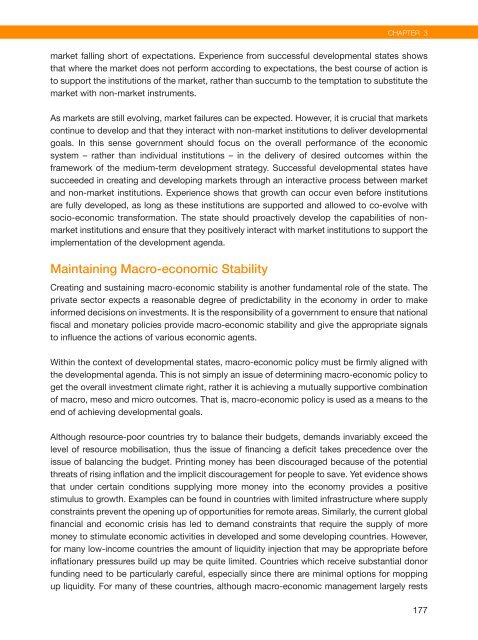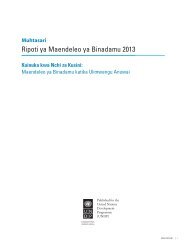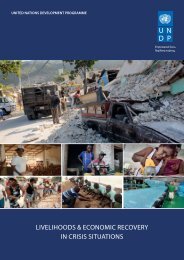Poverty and Human Development Report 2009 - UNDP in Tanzania
Poverty and Human Development Report 2009 - UNDP in Tanzania
Poverty and Human Development Report 2009 - UNDP in Tanzania
Create successful ePaper yourself
Turn your PDF publications into a flip-book with our unique Google optimized e-Paper software.
market fall<strong>in</strong>g short of expectations. Experience from successful developmental states shows<br />
that where the market does not perform accord<strong>in</strong>g to expectations, the best course of action is<br />
to support the <strong>in</strong>stitutions of the market, rather than succumb to the temptation to substitute the<br />
market with non-market <strong>in</strong>struments.<br />
As markets are still evolv<strong>in</strong>g, market failures can be expected. However, it is crucial that markets<br />
cont<strong>in</strong>ue to develop <strong>and</strong> that they <strong>in</strong>teract with non-market <strong>in</strong>stitutions to deliver developmental<br />
goals. In this sense government should focus on the overall performance of the economic<br />
system – rather than <strong>in</strong>dividual <strong>in</strong>stitutions – <strong>in</strong> the delivery of desired outcomes with<strong>in</strong> the<br />
framework of the medium-term development strategy. Successful developmental states have<br />
succeeded <strong>in</strong> creat<strong>in</strong>g <strong>and</strong> develop<strong>in</strong>g markets through an <strong>in</strong>teractive process between market<br />
<strong>and</strong> non-market <strong>in</strong>stitutions. Experience shows that growth can occur even before <strong>in</strong>stitutions<br />
are fully developed, as long as these <strong>in</strong>stitutions are supported <strong>and</strong> allowed to co-evolve with<br />
socio-economic transformation. The state should proactively develop the capabilities of nonmarket<br />
<strong>in</strong>stitutions <strong>and</strong> ensure that they positively <strong>in</strong>teract with market <strong>in</strong>stitutions to support the<br />
implementation of the development agenda.<br />
Ma<strong>in</strong>ta<strong>in</strong><strong>in</strong>g Macro-economic Stability<br />
Chapter 3<br />
Creat<strong>in</strong>g <strong>and</strong> susta<strong>in</strong><strong>in</strong>g macro-economic stability is another fundamental role of the state. The<br />
private sector expects a reasonable degree of predictability <strong>in</strong> the economy <strong>in</strong> order to make<br />
<strong>in</strong>formed decisions on <strong>in</strong>vestments. It is the responsibility of a government to ensure that national<br />
fiscal <strong>and</strong> monetary policies provide macro-economic stability <strong>and</strong> give the appropriate signals<br />
to <strong>in</strong>fluence the actions of various economic agents.<br />
With<strong>in</strong> the context of developmental states, macro-economic policy must be firmly aligned with<br />
the developmental agenda. This is not simply an issue of determ<strong>in</strong><strong>in</strong>g macro-economic policy to<br />
get the overall <strong>in</strong>vestment climate right, rather it is achiev<strong>in</strong>g a mutually supportive comb<strong>in</strong>ation<br />
of macro, meso <strong>and</strong> micro outcomes. That is, macro-economic policy is used as a means to the<br />
end of achiev<strong>in</strong>g developmental goals.<br />
Although resource-poor countries try to balance their budgets, dem<strong>and</strong>s <strong>in</strong>variably exceed the<br />
level of resource mobilisation, thus the issue of f<strong>in</strong>anc<strong>in</strong>g a deficit takes precedence over the<br />
issue of balanc<strong>in</strong>g the budget. Pr<strong>in</strong>t<strong>in</strong>g money has been discouraged because of the potential<br />
threats of ris<strong>in</strong>g <strong>in</strong>flation <strong>and</strong> the implicit discouragement for people to save. Yet evidence shows<br />
that under certa<strong>in</strong> conditions supply<strong>in</strong>g more money <strong>in</strong>to the economy provides a positive<br />
stimulus to growth. Examples can be found <strong>in</strong> countries with limited <strong>in</strong>frastructure where supply<br />
constra<strong>in</strong>ts prevent the open<strong>in</strong>g up of opportunities for remote areas. Similarly, the current global<br />
f<strong>in</strong>ancial <strong>and</strong> economic crisis has led to dem<strong>and</strong> constra<strong>in</strong>ts that require the supply of more<br />
money to stimulate economic activities <strong>in</strong> developed <strong>and</strong> some develop<strong>in</strong>g countries. However,<br />
for many low-<strong>in</strong>come countries the amount of liquidity <strong>in</strong>jection that may be appropriate before<br />
<strong>in</strong>flationary pressures build up may be quite limited. Countries which receive substantial donor<br />
fund<strong>in</strong>g need to be particularly careful, especially s<strong>in</strong>ce there are m<strong>in</strong>imal options for mopp<strong>in</strong>g<br />
up liquidity. For many of these countries, although macro-economic management largely rests<br />
177





